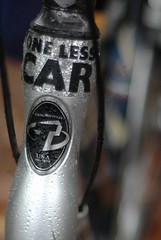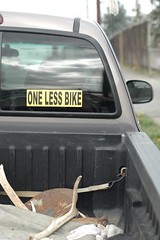
advocates tone down the rhetoric.
(Photo © J. Maus/BikePortland)
Some of the most important insights from the National Bike Summit (which wrapped up Thursday morning with a bike ride) came from an unexpected place. Douglas Meyer, a marketing and communications specialist with Bernuth & Williamson Consulting, shared research on Tuesday that delved into how bicycling is perceived by senior policymakers and Congressional staffers from both political parties. His findings underscore that the bike movement is evolving and its advocates must evolve along with it.
For years, advocates have fought for dedicated funding streams, they’ve asked for their “fair share,” they’ve evangelized the myriad virtues of bicycling to those who don’t “get it,” they’ve yearned for acceptance within mainstream culture and among policymakers, and they’ve proudly labeled themselves, “bicyclists.” According to Meyer’s research, that all needs to change. Many advocates also assume there’s widespread and entrenched opposition to bicycling on Capitol Hill. That mindset, says Meyer, is wrong.
“Advocates are being a little too evangelical. There’s a risk of bicycle promotion becoming the equivalent of selling snake oil.”
— Douglas Meyer
Meyer’s research, which was commissioned by the League of American Bicyclists, was based on 30 in-depth interviews and an online survey taken by advocates at the Summit. The insights he gleaned are invaluable and should be mandatory reading for everyone involved in bike advocacy.
A big takeaway from Meyer’s research (and the Summit overall) is that bicycling should no longer be considered a fringe activity. From the huge positive impact of bike-sharing and the proliferation of protected bikeways in U.S. cities; to US DOT Secretary Ray LaHood’s efforts to legitimize non-motorized transportation — the national profile of cycling has never been higher. That means advocates must shift their frame-of-reference.
“Bicycling advocates now have a seat at the table,” said Meyer during an interview on Wednesday, “So instead of convincing people that they need that seat, now they need to sit down and start working together on solutions.”
What about the supposed opposition to bicycling that many legislators have?
“I found that much of this opposition was much less about the ends and more about the means,” Meyer explained. “It wasn’t necessarily an opposition to bikes, the opposition is to larger issues like how government functions. People may be agnostic about bikes… It’s not to say that they’re avid supporters of cycling, but they weren’t avid opponents. They really just had questions about where the money comes from and who makes the decisions about where it goes.” The way Meyer sees it, those are the same questions being asked about a lot of issues, not just bicycling.
So get over it. “Bike advocates might be taking this all a bit too personally,” said Meyer.
made possible by:
- Planet Bike
- Pro Photo Supply
- Readers like you!
There’s a whole lot of passion in the bike movement. Maybe too much. Based on his interviews, Meyer thinks it might be time to tone things down a bit. “Advocates are being a little too evangelical,” is how he put it. “There’s so much good news about biking. We all know its many benefits; but that tends to backfire… There’s a risk of bicycle promotion becoming the equivalent of selling snake oil.”
On this note, Meyer shared a quote from one of his interviews:
“When someone who is not already a supporter of bicycling hears (from an advocate) how cycling is going to save the world, they simply don’t believe it.”
To help tone down this evangelism, Meyer recommends building alliances with unlikely suspects and working hand-in-hand with other modes to find solutions.
“‘One less car’ is the worst thing to say,” said Meyer. Or, in the words of one of his interviewees: “It can’t be about critical mass and kicking ass. It has to be about multi-modal, progressive, transportation options.”
Another faux pas, according to Meyer, is any talk of demanding a “fair share” of funding. “Those words just don’t seem to resonate and they immediately brought up the question of, ‘Where does the revenue come from and how is it allocated?’ which leads to a sense that people who bike are not paying into the system.”
Meyer shared several anonymous quotes from interviewees about funding issues:
“Focusing on having a dedicated funding source marginalizes the issue*, rather than… (an) approach where you accommodate all the needs and let the money go to that.”
“Advocates need to recognize the pressures on the Federal budget, and instead of relying on the dedicated funding…focus on how to access…the money (that is there).”
“One of my concerns is how the bike community is always arguing about ‘getting their fair share of funds.’ Everyone in transportation is always kvetching about not getting their fair share, and it is annoying…It shouldn’t be about parity but about results.”
Another part of Meyer’s research that is worth noting, is his call to stop using labels like “cyclist” or “bicyclist.” “I know ‘cyclist’ is part of your identity,” said Myer, “But I heard some pretty strong words about toning that down a bit. There are a lot of other people out there who might want to ride their bikes but they don’t want to call themselves cyclists.”
Resist these labels, warned Meyer. “Be inwardly bike-centric, but outwardly multi-modal and mainstream.”
I was very pleased to see these ideas being shared at the Summit. I haven’t written or said the words “cyclist” or “bicyclist” (or “motorist” or “pedestrian” for that matter) on this site for years. I’ve also long thought the continued advocacy for dedicated, set-aside funding streams is a losing strategy. It’s also worth noting that these findings are somewhat inconvenient for the League. There newly unveiled mission statement reads in part, “We are bicyclists” they’ve had entire campaigns devoted to a “fair share” for safety.
If you love bicycling and want to persuade others to feel the same way, Meyer’s report is full of great information on how to communicate effectively. Download it via the League’s blog (PDF).
More coverage from the National Bike Summit here.




